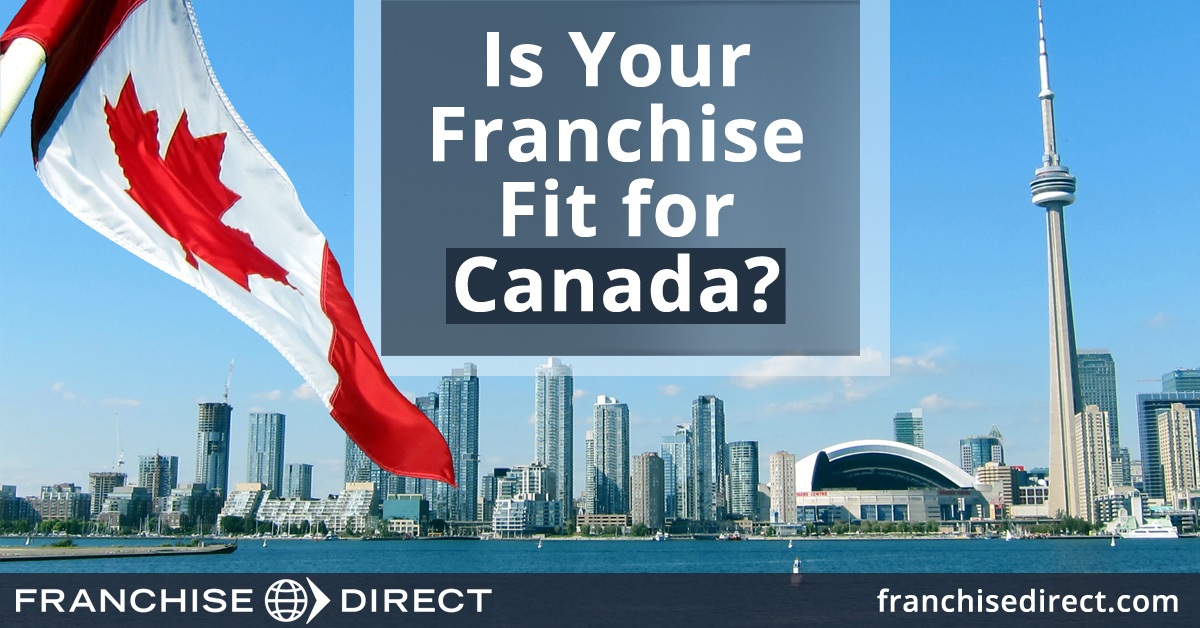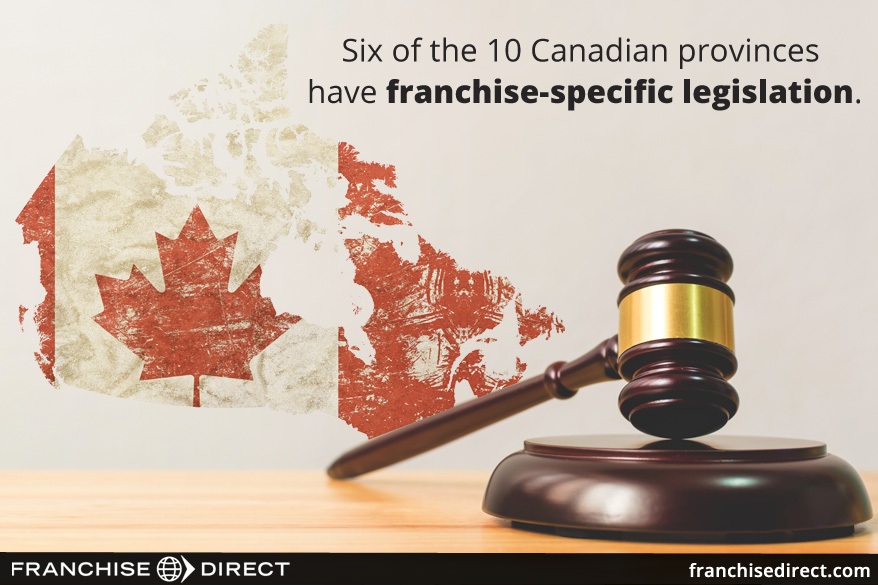🕒 Estimated Reading Time: ~8 minutes

Not only are the U.S. and Canada close geographically, they're close franchising-wise as well.
The U.S. is the largest franchise industry in the world and when U.S. franchises want to go international, often the first look is towards its neighbor to the north—the second largest franchise industry in the world.
In fact, for several of the franchises in our annual Top 100 that only operate in two countries, those two countries are virtually always the U.S. and Canada.
For good reason too.
Canada is not only close as it can be to the U.S. in proximity, the countries also share many cultural elements and a language (except for the province of Quebec where French is the official language, but English is still widely used there as well). Not to mention, the U.S. dollar stretches well in Canada.
Larry Weinberg, who specializes in franchise law and chairs the Legal & Legislative Affairs Committee at the Canadian Franchise Association, believes Canada is the No. 1 destination for U.S. brands.
<blockquote>“We are not really full-blown international to them. We’re a simpler place to go.” ~ Larry Weinberg</blockquote>

However, that simplicity doesn’t extend to Canada’s franchise regulatory environment. “It’s unusual. As far as I know, Canada is the only country in the world where part of the country has a franchise law and part of it doesn’t,” Weinberg says.
If you’re interested in bringing your franchise to Canada from another country, such as the United States, this article will help you gain some background on the Canadian franchise industry and a few of the considerations you will need to address
beforehand.
The Canadian Franchise Industry
According to the
Canadian Franchise Association (CFA), there are approximately 1,300 franchise brands operating in Canada across more than 40 sectors of business. These franchises generate over $100 billion each year for the Canadian economy. Here are a few more quick facts on the market:
- Canada is the second largest franchise economy in world, only trailing the United States.
- Franchising is the 12th largest sector of the economy in Canada, representing 5% of the country’s GDP.
- Ontario leads the rest of the country in franchising with 56% of franchises headquartered in Ontario (primarily in the Greater Toronto area).
- Approximately $1 of every $5 is spent on goods or services at franchise.
- Nearly two million Canadians are employed by the franchise industry directly.
Per a survey, the top industries in which prospective Canadian franchisees are looking for an opportunity include:
Canadian Franchise Regulation
<blockquote>“It’s unusual. As far as I know, Canada is the only country in the world where part of the country has a franchise law and part of it doesn’t.” ~ Larry Weinberg</blockquote>
Six of the 10 Canadian provinces have franchise-specific legislation, with the British Columbia Franchise Regulation Act being the most recent addition in 2017. The other provinces with franchise-specific legislation are Alberta, Manitoba, New Brunswick, Ontario and Prince Edward Island.
The CFA does its best to foster transparency between franchisors and prospective franchisees by requiring members to produce a disclosure document, but the requirement doesn’t cover all the franchises in Canada, only members of the CFA.
As denoted on its website: “The CFA Disclosure Document Guide is the minimum level of disclosure required of members in the CFA. Those companies franchising within provinces with franchise legislation must follow the legislated requirements in those provinces.”
These are the current 17 sections of the CFA Disclosure Document:
- Corporate Name of Franchisor
- Business Experience of the Franchisor
- Directors, General Partners and Officers
- Franchise Experience of the Franchisor
- Nature of Business
- Existing Franchisees
- Corporate Outlets
- Required Investment by the Franchisee
- The Franchise Documents
- Rebates
- Earnings Claims
- Opportunity to Review Documents and Investigate the Franchise
- Bankruptcy and Insolvency
- Existing Litigation
- Outlet Closures
- Other Material Information
- Certificate of Disclosure

As in a number of other countries, disclosure must be made at least 14 days before the payment of any money to the franchisor (or its affiliate) or the signing of any agreement by a prospective franchisee relating to the franchise.
Important Legal Notes for Québec
With the exception of Québec, the Canadian legal system is based on the common law tradition of the United Kingdom.
According to Dickinson Wright LLP:
Common law principles in Canada, such as those found in the law of tort, contract or property (both real and personal) are quite similar to those of the United States. The Québec legal system, however, evolved from French civil law. In Québec, the civil law system applies to private law matters. Thus, to the extent Québec is empowered by the Canadian Constitution to make laws, Québec uses a civil code – the Civil Code of Québec (CCQ).
Also, given that the majority of the population of the province speaks French as a first language, it’s important to take note that any contracts involving parties in Québec need to be drafted in French (unless the parties agree in writing otherwise).
In fact, per Québec’s Charter of the French Language, any documentation addressed to the public or to the franchise’s employees must be in French first and must be displayed equally or more prominently than any other language used. This provision also applies to trademarks and company names, unless a company has an English name or trademark only. In that event, the English name or mark may be used without a French counterpart.
Expanding Your Franchise to Canada
Fortunately, the lack of uniformity in franchise laws across the country hasn’t been a deterrent to franchise expansion in Canada.
“I have clients from all over the world who see Canada as a wonderful, politically, financially, culturally stable jurisdiction to develop their markets,” says Stéphane Teasdale, chairman of the international law firm’s global franchise and distribution law group at Dentons Canada LLP (she also serves as co-head of the corporate and commercial law group). “[Clients] see Canada as being a relatively easy and not so expensive place to do business, with 30-million-plus people to buy their goods and services.”
It also helps franchisors entering the Canadian franchise market that lenders see the value in franchising. “Every Canadian bank has now established a national franchise department specifically to deal with the growing demand for startup franchised businesses,” according to Peter H. Thomas, chairman and CEO of Thomas Franchise Solutions.

To expand into Canada, one of the first things a franchisor should do—if not the first thing—is protect their system’s trademarks by applying for registration under the country’s federal Trademarks Act.
Other than protection of intellectual property, the biggest reason for this is a registered trademark is a prerequisite for expansion through licensed franchisees in Canada. Once registered, the franchisor’s trademark will
be good forever if the trademark is used on a continual basis and a renewal fee is paid every 15 years.
It’s highly advised that franchisors entering the Canadian market employ a master franchisee.
While franchisors can begin franchising in Canada through more direct methods, the majority choose to enter via one or a few master franchisees or area developers and empowering them to expand the franchise system throughout Canada, according to Dickinson Wright LLP.
To expand further, master franchisees (also called sub-franchisors) are delegated power from the franchisor to recruit and train new franchisees in a given territory, which could be as small as a portion of a city or as large as a whole country. This setup puts the master franchisees in a managerial role over other franchisees as an intermediary between the franchisor and unit franchisees.
Area developers commonly enter into contracts with franchisors to sell a specified number of franchises for the franchisor within a territory in a given timeframe. Think of the master franchisee as a company supervisor and the area developer as a contracted recruiter.
The advantages for either is that the franchisor is (hopefully) hiring someone with local area business knowledge who can help the franchisor shorten their learning curve as it immigrates its business into a new country.
Another consideration is deciding whether or not to incorporate a Canadian branch of your company.
According to Toronto-based franchise lawyer Chad Finkelstein, “Tax considerations may help determine whether a Canadian affiliated company should be established to operate and grant [franchise] rights here.” He explains that most franchise fees that Canadian franchisees pay to an out-of-country franchisor will be subject to a non-resident withholding tax of 10%.
If the decision is made to incorporate in the country, there are implications that would determine which province would be most appropriate. For instance, Ontario requires that at least 25% of a corporation’s directors be resident Canadians.
Additionally, registering a domain name could be a bit tricky without a Canadian base.
Canada has a country level domain name system, with websites for domestic companies operating under .ca domain names. However, there are restrictions on who can hold a .ca domain name registration.
Registering a domain name could be a bit tricky without a Canadian base.

Non-Canadian franchisors who want to protect their trademarks by acquiring their .ca domain name equivalents will typically have to incorporate a Canadian company to hold the .ca domain name, unless the franchisor is also the owner of the equivalent Canadian trademark registration.
Do Your Due Diligence
Of course, the above are only a few of the considerations that go into entering the Canadian market with your franchise. “Expanding into Canada is not as simple as transposing your business model, system, design and decor, menu, advertising campaigns and brand standards from your home version,” as Finkelstein says. “Importing a brand here does require understanding Canadian tastes and accommodating them.”














